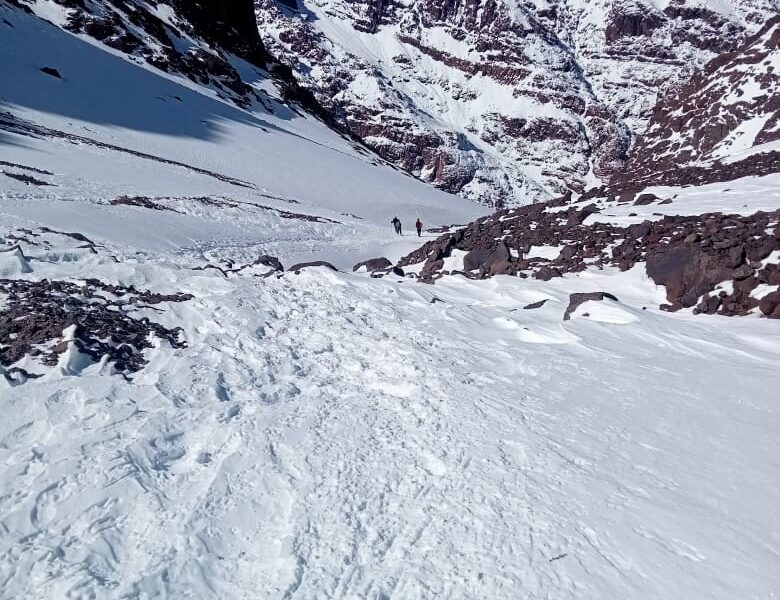Toubkal Location
Mount Toubkal is located in the High Atlas Mountains of Morocco and is the highest peak in both the Atlas Mountain range and North Africa. The Atlas Mountains themselves stretch for around 2,500 kilometres (1,550 miles) through Morocco, Algeria, and Tunisia. The range serves as a natural barrier separating the Sahara Desert to the south from the Mediterranean Sea and Atlantic Ocean to the north, and is home to a diverse array of flora and fauna, as well as many traditional Berber communities.
How high is Mount Toubkal
Mount Toubkal is the highest peak in the Atlas Mountains and has an elevation of 4,167 metres (13,671 feet) above sea level. It is located in the Toubkal National Park in the High Atlas range of Morocco.
How long does it take to climb Mount Toubkal?
While it is technically possible to summit Mount Toubkal in two days, it’s generally recommended to take more time to acclimatise to the altitude and to fully appreciate the stunning scenery of the High Atlas Mountains. Many trekkers opt for longer routes, such as a three-day trek, which allows for more time to acclimatise and take in the breathtaking landscapes along the way. Additionally, a longer trek may allow for more flexibility in case of unexpected changes in weather or other conditions. Regardless of the route taken, the Atlas Mountains offer a wealth of natural beauty and cultural richness that can make for an unforgettable trekking experience.
‘Official’ Recommendations for Climb Durations
Fastest ascent of Toubkal
The fastest person to climb Mount Toubkal, which is the highest peak in the Atlas Mountains and in North Africa, varies depending on the specific criteria being used. However, one notable record was set in 2018 when Spanish athlete Kilian Jornet completed the round-trip ascent and descent of Mount Toubkal in just 2 hours, 25 minutes, and 22 seconds, setting a new record for the fastest known time (FKT) for the route. It’s worth noting that this record was for a specific route, and there may be other routes up the mountain where someone has set a faster time.
- Lala Lallia Star Dune
- Star Dune in Morocco: Discover the Ancient Beauty of Lala Lallia
- A Guided Trekking Adventure in Morocco: Conquering Mount Toubkal
- Training for Toubkal
- Minimum Suggested Health Requirements for Climbing Toubkal
Fastest woman to climb Toubkal
Records for speed climbing are often difficult to track and verify, especially for specific routes or variations on routes. However, I can tell you that there have been many accomplished female mountaineers who have successfully summited Mount Toubkal, including those who have set records or achieved notable feats. Some notable female mountaineers who have climbed Mount Toubkal include Spanish mountaineer Edurne Pasaban, who became the first woman to climb all 14 peaks over 8,000 metres in 2010, and Slovenian mountaineer Marija Frantar, who became the first woman to climb Mount Toubkal in winter in 1974.
Mount Toubkal National Park
Toubkal National Park is located in the High Atlas Mountains of Morocco, around 70 kilometres (43 miles) south of the city of Marrakech. It covers an area of 380 square kilometres (147 square miles) and is home to a diverse range of plant and animal species, including the endangered Barbary macaque. The park is named after Mount Toubkal, which is the highest peak in both the park and in North Africa, with an elevation of 4,167 metres (13,671 feet) above sea level. The peak is often referred to as Jebel Toubkal, with “Jebel” being the Arabic word for mountain.
Mount Toubkal needs more assault routes
While it’s true that there is currently only one main ascent route to the summit of Mount Toubkal, there are actually a few different variations on that route that can provide some variation for those who wish to climb the mountain. Additionally, there are other peaks and routes in the Atlas Mountains that offer their own unique challenges and rewards for climbers and trekkers.
That being said, there is always room for more exploration and development of new routes in the Atlas Mountains and elsewhere. However, any new routes or developments should be done in a responsible and sustainable manner, taking into account the local environment, culture, and communities. It’s important to ensure that any new routes or developments do not harm the natural beauty or cultural richness of the areaand that they are respectful of the local communities and their way of life.
Mount Toubkal History
Mount Toubkal has a long and rich history, as it has been an important landmark and destination for thousands of years. Here are a few key points about the mountain’s history:
The High Atlas Mountains, where Mount Toubkal is located, have been inhabited by Berber communities for thousands of years. The Berbers are indigenous peoples of North Africa, and they have a rich culture and history that is closely tied to the mountains and the surrounding landscapes.
Mount Toubkal has long been considered a sacred site by the local Berber communities, who have a deep spiritual connection to the mountain and its surroundings. Many Berber traditions and beliefs are tied to the natural features of the landscape, and Mount Toubkal is no exception.
The first recorded ascent of Mount Toubkal was made in 1923 by a French mountaineering expedition led by the explorer Marquis de Segonzac. Since then, the mountain has become a popular destination for climbers and trekkers from around the world.
In 1949, the Toubkal National Park was established, which helped to protect the natural beauty and cultural significance of the area. The park covers an area of 380 square kilometres (147 square miles) and is home to a diverse range of plant and animal species.
Today, Mount Toubkal and the Atlas Mountains continue to be a source of inspiration and fascination for people from all walks of life. The mountains offer a unique blend of natural beauty, cultural richness, and historical significance that is truly unparalleled.

